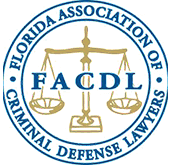Money Laundering in Florida
Florida’s Money Laundering Act is found in § 896.101, Fla. Stat. (2022). Under this law, you can be convicted of money laundering if you do the following things:
- Selling or attempting to sell property that you know was the proceeds of illegal activity
- Engaging in a financial transaction that you know is meant to conceal the owner’s identity or the source of the proceeds to avoid reporting requirements
- Attempting to hide the details of an illegal transaction to evade the law
- Selling property that would be viewed as an illegal transaction by the court or a law enforcement officer
The penalties for money laundering are based on the property’s value as follows:
- $300 up to $19,999 – Third-degree felony punishable by five years in prison and a fine of up to $5,000
- $20,000 up to $99,999 – Second-degree felony with a potential prison sentence of 15 years and fine of up to $10,000
- $100,000 + – First-degree felony with a potential prison sentence of 30 years and a fine of up to $15,000
In addition to the above-listed penalties, people who are charged with money laundering also face a civil penalty that won’t be more than the value of the transactions involved in the crime or $25,000.
Real Estate Fraud
Under § 817.535, Fla. Stat. (2022), you can be charged with real estate fraud if you file fictitious or fraudulent documents against someone else’s real property to deprive the owner of their real estate interest or to defraud or harass the owner. This offense is a third-degree felony with a potential sentence of five years in prison and a fine of up to $5,000.
Mortgage Fraud
Mortgage fraud is found in § 817.545, Fla. Stat. (2022). You can be charged with mortgage fraud if do the following things:
- Make material false statements or misrepresentation while trying to get a mortgage to mislead the lender
- Make the representations to mislead the lender
- File a document that contains the false statement or misrepresentation
- Receive funds stemming from the false information
Mortgage fraud is a third-degree felony for mortgage loans valued at less than $100,000 with a potential prison sentence of five years and a fine of $5,000. If the loan is worth $100,000 or more, mortgage fraud is a second-degree felony with a potential prison sentence of 15 years and a fine of $10,000.
Security Interest Fraud
Under § 817.562, Fla. Stat. (2022), security interest fraud occurs when someone participates in an agreement about a security interest in personal property and sells the property without telling the owner about the proceeds or disposes of it in violation of the security interest agreement.
Security interest fraud involving property worth up to $299 is a first-degree misdemeanor with a potential sentence of one year and a fine of $1,000. Security interest fraud involving property worth $300 or more is a third-degree felony with a potential prison sentence of five years and a fine of up to $5,000.
Credit Card Fraud
Credit card fraud is found in § 817.481, Fla. Stat. (2022). Under this law, you can be charged with credit card fraud if you use someone else’s credit card or card number to purchase items or services without their permission. If you commit credit card fraud for property valued at $300 or more, you will face charges of grand larceny. If the property is valued at less than #$300, you will be charged with petit larceny.
Patient Brokering
Under § 817.505, Fla. Stat. (2022), it is illegal for people to do the following things:
- Pay or receive bonuses, kickbacks, bribes, or commissions or engage in spit-fee agreements for patient referrals
- Solicit kickbacks, bonuses, or commissions for referring patients
- Pay or receive kickbacks, commissions, or bonuses to a healthcare facility to get them to recognize a particular type of treatment
The penalties for patient brokering are based on the number of patients. If someone commits patient brokering involving fewer than 10 patients, it is a third-degree felony with a sentence of up to five years and a $5,000 fine. If patient brokering involves 10 to 20 patients, it is a second-degree felony with a potential sentence of 15 years, a fine of $10,000, and an additional $100,000 fine. If patient brokering involves more than 20 patients, it is a first-degree felony with a sentence of up to 30 years, a fine of $15,000, and an additional fine of $500,000.
Theft of Trade Secrets
Under § 812.081, Fla. Stat. (2022), you can be charged with trade secrets theft if you steal a company’s trade secret to try to use it for your advantage and deprive the owner of its ability to control and protect the trade secret. This offense is a third-degree felony with a potential sentence of five years and a fine of up to $5,000. You can’t defend against this offense based on your intention to return the trade secret or the fact that you returned it.
Get Help From a Port Saint Lucie Fraud Lawyer
If you are facing charges for a white-collar crime or have learned that you are under investigation, you should reach out to Saint Lucie fraud lawyer Jeffrey H. Garland, Esq. We can guide you throughout the process and aggressively defend against the charges against you. If you are convicted of a white-collar crime, the conviction will remain on your record and potentially impact both your career and your relationships. Call us today to request a consultation at (772) 489-2200.






